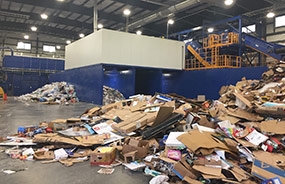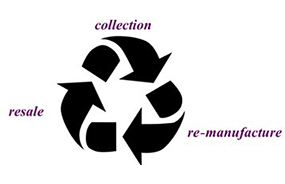Why recycling is important, how we’re making it better and what you can do

Facility where residential material is sorted and baled into products that are marketed (Photo by Tammy Schwass of the Material Recovery Facility, Lethbridge)
The Recycling Council of Alberta (RCA) works to promote, facilitate and advocate for a circular economy in Alberta through waste reduction and resource conservation. This post addresses economic, environmental and systemic myths about recycling and provides steps you can take to ensure your efforts to recycle are fruitful.
There is a patchwork of recycling programs and policies across Canada because provinces have jurisdiction over recycling, and each has built its own system. While no two systems are the same, they all strive for positive economic and environmental outcomes.
Related content
Recently, some recycling programs have had to remove materials from their programs and glass or certain types of plastic are no longer allowed in the recycling stream. To find end markets that can take the materials, there needs to be better sorting to produce better quality materials.

Mobius loop (Graphic by Recycling Council of Alberta)
One detailed explanation of the recycling system is within the mobius loop, a ubiquitous symbol for recycling. Many people think that once they put recyclables on the curb, they have recycled. The reality is that is only the first step in the loop and, though important, it is not complete until the materials are turned into a new product.
Reduction is still at the top of the hierarchy and has the most dramatic impact on reducing greenhouse gases. To discuss the pillars of the recycling system, here are the top three reasons why recycling is important:
- The environment: Studies conducted by Environment Canada and other credible international organizations have shown that recycling is a very effective way to reduce greenhouse gases (GHGs), as less energy is required to re-manufacture materials than from producing materials from virgin resources. And, despite common perception, the collecting and shipping of recyclables produces only a relatively small amount of GHGs, in comparison to mining resources.
- Economics: The economics of recycling plays a large part in driving the demand for recycled materials and making the whole process feasible. The RCA questioned the economic value of recycling and completed a study on Alberta’s recycling sector, which was released in September. The study found that in 2018, the sector generated $700 million in economic value, along with 7,500 direct jobs. If we increased opportunities for recycling (through investment and policies to promote recycling), the sector could double in value, to $1.4 billion and over 13,000 jobs. This report strongly supports the economic benefits of recycling.

Graphic by Recycling Council of Alberta
- System change: To achieve positive environmental outcomes and grow the value we see in the sector, we need to change the way we do things. Many provinces have moved to a system for recycling called extended producer responsibility. This means that the producers of a product are responsible for managing the materials at the post-consumer stage of the product’s life cycle. This helps shift the costs and operational responsibilities for managing recycling systems (including finding markets) from local governments to producers. This can make the system much more effective, incentivize packaging design for recyclability, create economies of scale (to move materials to end-markets) and save taxpayers’ money.
All of these pieces are reasons why it’s important to recycle, and why we need to work to drive better environmental and economic outcomes. This is all part of creating a circular economy, where we reduce consumption and design materials to be reused or recycled, and start to look at ways where we can shift from a linear system of take, make and dispose, into a circular one.
What you can do
- Almost every province has advocacy organizations like the RCA, so search yours out today and check out their projects and resources.
- Ask what can be included in your recycling system. Don’t wish-cycle (put something in the recycling bin with hopes that it will get recycled). This causes issues in the sorting system and the material will end up being sent to landfill anyway.
- Reduce your consumption. This is still the first/greatest action you can take to reduce your footprint!
For more information
- Circular economy: Ellen MacArthur Foundation
- Circular cities: Recycling Council of Alberta
- Quantifying the economic value of Alberta’s recycling programs


